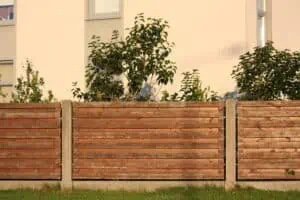How Long Does a Vinyl Fence Last?
Depending on your location and the quality of the material used, your vinyl fence can last anywhere from 20 to 30 years. Aside from regular maintenance, proper installation will help to increase its longevity. You should consider yearly inspections to catch damage before it is too late.
(Searching in Google “chain link fence cover“? Contact us today!)

While the life of a vinyl fence is impressive, it doesn’t come without its downsides. The most common culprit is falling trees. If you have a large tree with branches that are particularly susceptible to dropping, you may want to trim the branches. Likewise, dogs and cats can scratch or chew your fence. You should never use a weed whacker near your vinyl fence as this can damage the posts.
Thankfully, modern vinyl fencing is built to withstand harsh weather, UV rays, and other elements. However, they still need some TLC to get them to look their best. To extend the life of your vinyl fence, follow these tips.
The most basic rule of thumb is to have your fence on solid ground. This will protect your investment and extend its lifespan. If you live in a coastal area where strong winds can break down your fence, you may need to adjust your materials and installation. It’s also a good idea to consider installing thicker posts that are embedded into the concrete. If you don’t have the budget to install a new fence, you can recount your home with the same material.
You can clean a vinyl fence with household cleaners or a power washer. For the best results, don’t use bleach or other harsh chemicals to do so. In wet areas, rough surfaces can lead to mildew. You can also buy an inexpensive water hose that will help to clean your vinyl fence.
When it comes to the life of a vinyl fence, you may be surprised at how easy it is to clean. You can use soapy water, a high-speed nozzle, and a mild detergent. Taking care of your fence will extend its longevity and make it look like it just came off the showroom floor.
While a vinyl fence may cost more than a wood fence, it will also give you the benefit of not having to replace it as often. Unlike wooden fences, vinyl is not likely to rot or warp. It is also resistant to fire and pests. You should also inspect your fence from time to time to see if it needs to be repaired. You can also consider a waterproofing treatment, if necessary. This will allow your vinyl fence to last for decades.
If you don’t want to spend a lot of money on your fence, you can opt for the faux-wood grain finish. You can also purchase decorative post caps to add to the overoptionssthetic appeal of your fence. These are great option for commercial properties.
Another reason to have a vinyl fence is that it can be installed on a slope. This type of fence is usually not as aesthetically pleasing as a straight-up vertical line, but it can be very durable.

